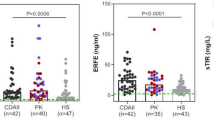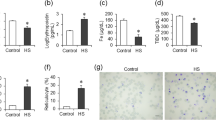Abstract
IN a recent communication, Jonxis1 reports quantitative estimations of alkali-resistant and labile hæmoglobin in cases of hæmolytic disease of the newborn. He comes to the conclusion that after birth only hæmoglobin of the labile, adult type is formed, and that in hæmolytic disease of the new-born there is a selective destruction of red blood corpuscles containing fœtal hæmoglobin. We carried out in the years 1939–42 a great number of similar estimations; these have been briefly reported previously elsewhere2,3.
This is a preview of subscription content, access via your institution
Access options
Subscribe to this journal
Receive 51 print issues and online access
$199.00 per year
only $3.90 per issue
Buy this article
- Purchase on Springer Link
- Instant access to full article PDF
Prices may be subject to local taxes which are calculated during checkout
Similar content being viewed by others
References
Jonxis, J. H. P., Nature, 161, 850 (1948).
Baar, H. S., and Hickmans, E. M., J. Physiol., 100, Proc. 3 (1941).
Baar, H. S., and Lloyd, T. W., Arch. Dis. Child., 18, 124 (1943).
Haurowitz, F., Hoppe-Seylers Z., 183, 78 (1929).
Mollison, P. L., Arch. Dis. Child., 18, 161 (1943).
Author information
Authors and Affiliations
Rights and permissions
About this article
Cite this article
BARR, H. Fœtal Hæmoglobin and Erythroblastosis. Nature 162, 190–191 (1948). https://doi.org/10.1038/162190a0
Issue Date:
DOI: https://doi.org/10.1038/162190a0
This article is cited by
-
�ber das Auftreten alkaliresistenten H�moglobins bei Kindern mit An�mien
Zeitschrift f�r Kinderheilkunde (1952)
Comments
By submitting a comment you agree to abide by our Terms and Community Guidelines. If you find something abusive or that does not comply with our terms or guidelines please flag it as inappropriate.



